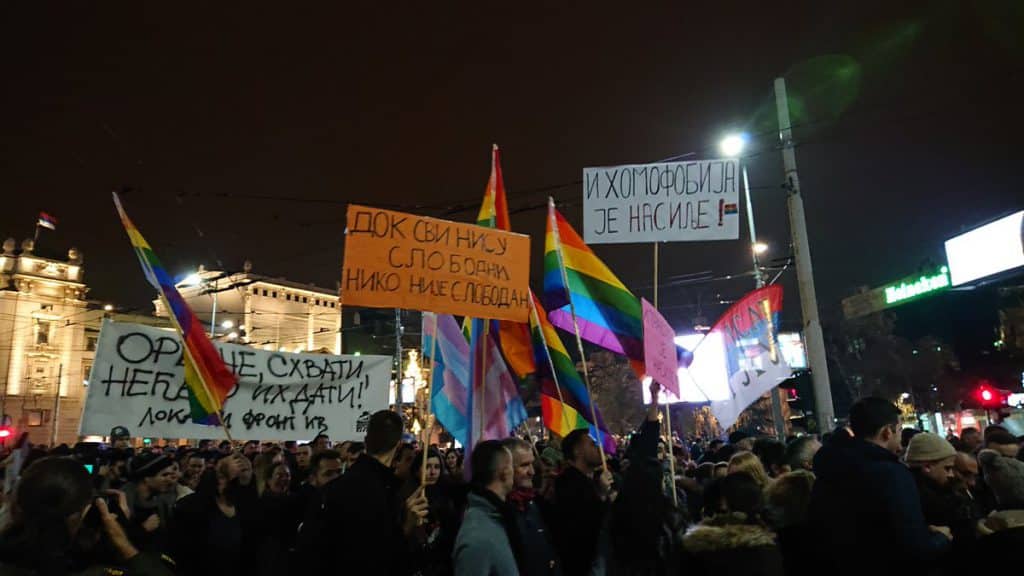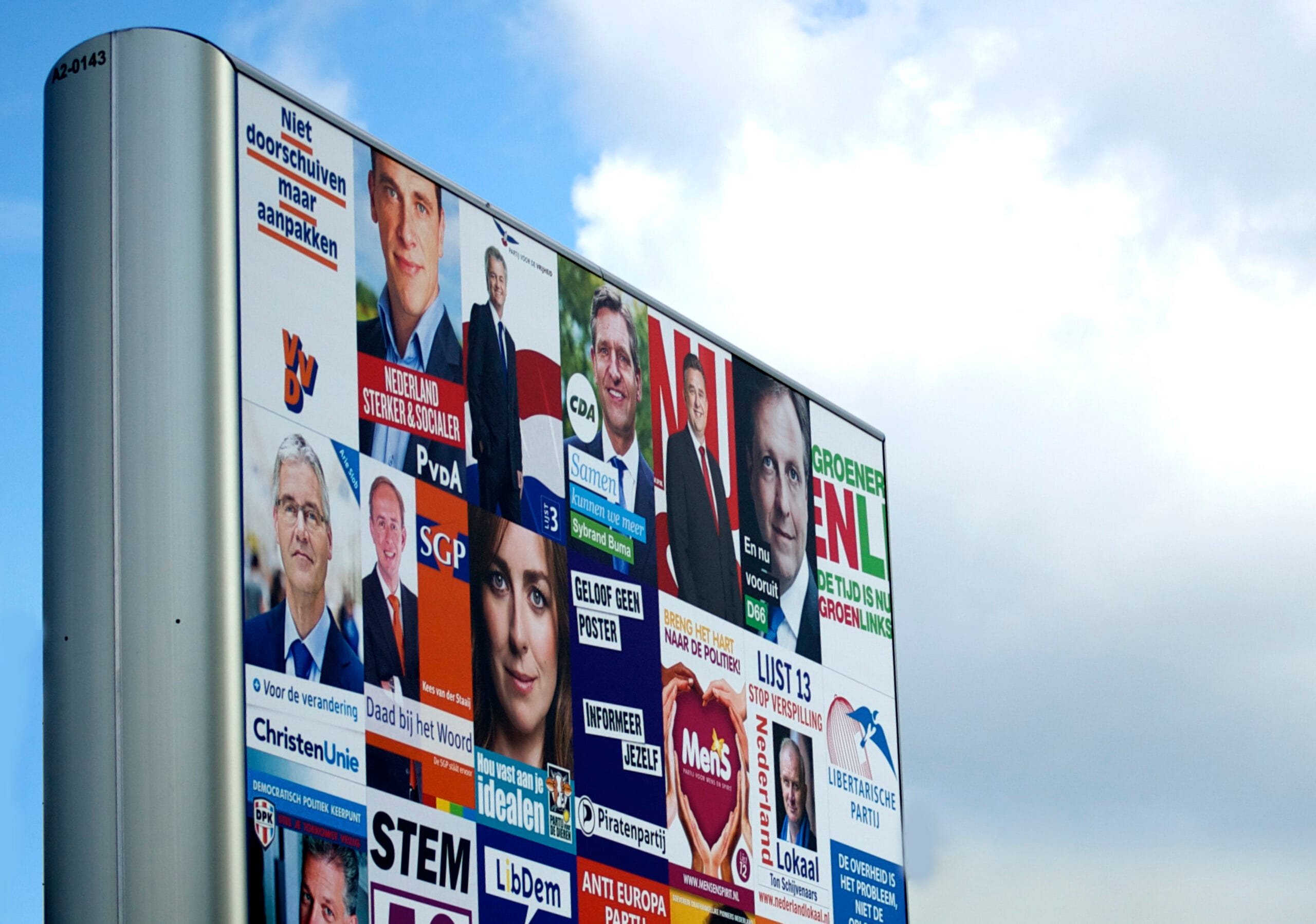By Merel Maurits
Serbian President Aleksandar Vučić, Serbian Progressive Party (SNS), is under pressure as the protests against him and his government are continuing. Every Saturday, since the 8th of December 2018, thousands of people are marching peacefully throughout Belgrade to protest against violence in the society and Vučić's repressive regime. The protests are supported by the opposition Alliance for Serbia which was created last September. More and more parties are joining the alliance. The Democratic Party (DS) is one of the founding members of the Alliance and we interviewed DS member and director of our partner Centre of Modern Skills (CMV), Miloš Djajić, to tell us more about the background of the protests and possible outcomes.
The trigger for the protest was the brutal attack on opposition politician, Borko Stefanovic, but they represent much deeper dissatisfaction. How would you describe the political situation in Serbia and what do the protesters demand?
It started last year with the assassination of moderate Oliver Ivanović, the oppositional Serbian leader from Kosovo. A whole year passed since his assassination, with constant demands for fast investigation and bringing those responsible to face justice responsible. This tragic event shows that we, as a society, crossed the red line when unknown people can commit a political murder uninvestigated and unpunished. Then the attempt to murder opposition Borko Stefanović with a metal rod provoked strong citizen's reaction in whole Serbia. After many years of pressure, attacks on media and intimidation, people liberated themselves and loudly said 'NO' to violence towards critics of the regime. The protesters' first demands are fair and free elections, liberation of media and stopping the atmosphere of physical attacks and violation of human rights. The political situation in Serbia is problematic because we live in a "captured state" which erodes citizens' rights and represents the main obstacle of normal life and EU integration.
What has been the response of the government on the protests?
So far the government didn't use any force against peaceful protesters. The typical response was all about media "spin" arguing that the number of protesters was decreasing. After the second protest, President Vučić stated that "even if five million protesters go out I wouldn't care about any of their demands". Because of that statement the protests got the slogan #1of5million. Now, after 8 weeks, protests are organised in more than 40 cities and the government found itself in a situation that it cannot ignore the demands anymore. Contrary to previous protests, they are now organised as citizens' protests without political articulation and politicians on the stage. However, the Democratic Party, as a member of oppositional Alliance for Serbia, supports and helps in organisation of the protests.
In 2000 protests broke out after the presidential elections. This forced Milošević to resign. To what extent can you compare the protest back than to those of the recent month?
This is a completely new situation. In 2000 people protested for their stolen votes. Now we protest against violence in the society and state capture, for freedom of the media, rule of law and democracy. In addition, the situation is now more complicated because in 2000 the international community supported opposition parties but now President Vučić enjoys support of the international community due to his willingness to enhance the relations with Kosovo.
Do which extent do you agree that the EU has chosen stability over democratic values?
We, as the Democratic Party, talked to representatives of European Union and other international organisations for years that the "price" for Kosovo agreement couldn't be suspension of democracy, pressure on the media, the capture of the state and political violence in the country. This practice is not a part of acquis communautaire and our road to accession negotiation. I have been fighting for European values and European Union accession for more than 20 years. I want to remind you that Vučić was a radical nationalist for decades and that the EU is too much tolerating his repression of democracy for the sake of stability. I think that the EU has her own internal challenges and lack of information about the situation in Serbia.
Vučić is betting on two horses: trying to integrate within the EU, while maintaining close ties with Russia. To which extend is this a sustainable foreign policy?
After a royal welcoming of the Russian President last month, the general impression is that ordinary people believe that Russia strongly supports Serbia and will defend us. Situation of the relation with Russia is more complicated. Vučić was pushed from EU and USA to finish negotiations with Kosovo and to sign any kind of Agreement on normalization of relations between Serbia and Kosovo as soon as possible. I have the impression that Russia wants the Kosovo case to remain in status quo (frozen conflict) without any agreement. As long as the Russian Humanitarian Centre in Niš doesn't have a diplomatic status we could say that Serbia continues its way towards the European integration. During Putin's official visit nobody mentioned this issue. Our rapprochement towards EU will affect our foreign policy and that's why opening chapter 31 (foreign, security and defence policy) is very important. After that EU will have a mechanism to insist on EU-Serbia common foreign policy solutions.
Early parliamentary election that Vučić is willing to hold, is not seen as a solution. Can you explain why?
One of the biggest problems with democracy in Serbia is that we don't have free and fair elections. During these 6 years of Serbian Progressive Party in power, they organised four, mostly early elections. Conditions for each election were worse. Next regular parliamentary elections are planned for spring 2020. Having a big majority in Parliament, Vučić wants to provoke a crisis in the ruling coalition and announce early elections, once again. Without regular and equal electoral conditions, the opposition parties declared readiness to boycott if new elections are announced this way. I think that international community has the responsibility to get involved and react because they could stop this kind of manipulation and erosion of democratic values. We are fighting for fair conditions and pressure the international community to monitor these negotiations on electoral conditions as they did in Macedonia.
A divided opposition gives Vučić and his party more chance to win the majority. Is the Alliance of Serbia able to unite the opposition and what are the current challenges within the alliance?
So far they showed that they are capable to do this job together since they're aware of the situation. The next election will be a chance and an opportunity for opposition to enhance its position. The role of the Democratic Party is also important for attracting more parties, movements, trade unions, different associations and intellectual elite to become a part of one strong opposition list.
Protesters are now asking for a plan of the opposition to reform the country. Is the Alliance of Serbia able to provide a clear plan?
Interparty dialog within the members of the Democratic Party is opened and we've started to discuss about this plan. I think that our struggle must be elaborated through two or three phases. First phase should be the fight for equal and better election conditions. Next phase is to find common points of cooperation and to make a program for the future transitional government. This government must be able to lead our country to another phase of transition and finish our European integration processes.
Photo: Miloš Djajić/Twitter




